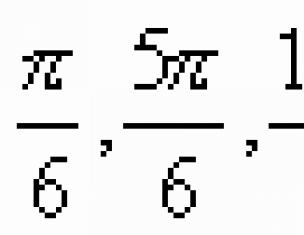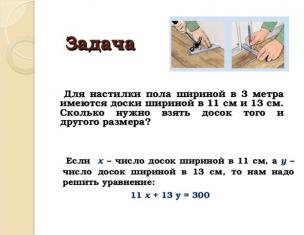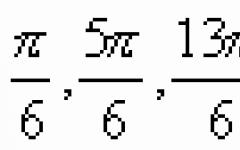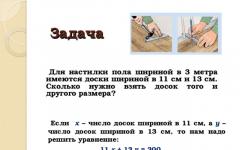The concept of a sentence occupies a central place in the syntax of the Russian language. Identifying the subject and predicate helps to distinguish a sentence from other syntactic units. This often causes difficulties, because in the Russian language predicates are divided into three types: simple verbal predicate, compound verbal and compound nominal.
The grammatical basis of a sentence
The secondary members in a sentence rest on a foundation consisting of a subject and a predicate. The predicative basis is the determining factor in the characteristics of a sentence: simple or complex, one-part or two-part.
It is by the presence of a subject and predicate that one judges what a syntactic unit is: a sentence has them, a phrase does not. For example, I'm walking down the street. Is a proposal because has a grammatical basis: I'm coming(subject and predicate respectively). Beautiful table- phrase, because there is no predicative basis.
A sentence does not always have all the grammatical basis. There are often cases when the subject or predicate is highlighted, then the sentence will be called one-part.
When analyzing a sentence, the problem of determining the predicate and its type causes the greatest difficulties.
What is a predicate
The predicate is part of the predicative basis of the sentence and forms a connective with the subject in gender, person and number. Thanks to the predicate, the sentence relates to reality and allows native speakers to communicate with each other. It is the bearer of the grammatical meaning of a syntactic unit: it indicates the reality and time of the narrative. The predicate answers questions regarding the actions of the subject, what it is, what happens to it, who it is and what it is.

There are two ways to determine the type of predicate:
- Morphological. Predicates are distinguished according to their relevance to one or another part of speech: verbal (expressed by a verb) and nominal (expressed by a noun or adjective). For example, The lights are dimly lit.(predicate are burning verb). We've been friends all our lives(predicate were friends nominal, expressed by a noun with a verb link).
- Composite. Simple and compound predicates, consisting of one grammatical whole and several words, respectively. For example, Which one of you will betray me?(predicate will betray- simple). I was angry(predicate was embittered- compound).
These two principles for determining predicates formed the basis of their type:
- Compound verb predicate.
- Compound nominal predicate
Types of predicates: simple and compound
All predicates of the Russian language are divided into simple and compound. This affiliation is determined by the number of words in the predicate. If there is more than one word, then the predicate is compound. The presence or absence of a linking verb in their composition will help to distinguish between a simple and a compound verbal predicate.

The role of the connective is performed by verbs indicating:
- stages of action (beginning, development, continuation);
- duty;
- desirability;
- state
These can also be short adjectives, state category words and the verb to be.
There are two types of compound predicates: nominal and verbal. Both of them contain an auxiliary linking verb. The verb predicate includes the infinitive, and the nominal predicate includes the nominal part.
If in a sentence the role of the predicate is played by a verb or its grammatical form, then it will be called a simple verbal predicate.
Simple verbal predicate (SVS): definition of the concept
Consists of a verb in one of three moods: indicative (Inside the house there was emptiness - the predicate reigned), subjunctive (Inside the house there was emptiness - the predicate would reign) or imperative (Let emptiness reign inside the house - let the predicate reign).
As can be seen from last example, ASG is not always one-word. There are cases when there are several of them, but the words are grammatically related: this can be a verb form (for example, imperative or future tense), an indivisible stable combination, or increasing expression by repeating the word.

Ways of expression
Methods of expressing a simple verbal predicate are divided into two groups: single-word and non-word.
| One-word | Ambiguous |
| Verb in one of the moods (indicative, imperative, conditional). | A verb form that contains two words:
|
| Infinitive. | A stable combination (phraseological unit) in the meaning of a single action ( to be lazy - “to be lazy”) |
| Interjections in verb form. | Verb reinforced by a modal particle ( a little Not fell). |
| The verb to be if has the meaning of presence or existence. | Repetition of cognate verbs in order to give expressive coloring ( waits and waits). |
ASG can be consistent with the subject if it takes the form of one of the moods. There are cases when the subject and predicate are not consistent - then the PGS has the form of an infinitive.
One-word ASG
Most often in the Russian language there is a one-word simple verbal predicate. Examples of sentences are presented below:

- I hear the trampling of horses.(PGS I hear- expressed by a verb in the indicative mood)
- Daughter, come with me.(PGS let's go- expressed imperative mood verb)
- Not going today means waiting until morning.(PGS wait- expressed by a verb in the initial form)
- And the glass bam - and on the floor.(PGS bam- expressed by verbal interjection)
- In the morning there was dew everywhere.(PGS was- expressed by the verb “to be” in the meaning of “presence”)
Ambiguous PGS
Such a predicate causes great difficulty for those who study Russian. A simple verbal predicate, consisting of several lexical units, can be characterized by the fact that the words in it are grammatically related. Sentences with a simple verb predicate that is not single-word:
- We will argue heatedly about what happened.(PGS we'll argue- expressed by an indicative verb in the future tense)
- I would go with you, but I need to go somewhere else.(PGS I would go- expressed by a conditional verb)
- Let everything be your way.(PGS let it be- expressed by an imperative verb)
- Everyone on the farm worked except Stepan. He, as always, was kicking ass.(PGS - was kicking ass- expressed by phraseological units meaning “lazy”)
- Let me do this work for you.(PGS let's do it- expressed by a verb with a modal particle)
- I can't wait for the cold weather to end.(PGS I can't wait- expressed by repetition of cognate verbs)
Coordination of the ASG with the subject
Consider sentences with a simple verbal predicate that agrees with the subject:

- Agreement in numbers: The car is driving along the new highway.(PGS rides- singular) - Cars drive along the new highway.(PGS are going- plural).
- Agreement in gender: The tractor was driving.(PGS was driving- masculine) - The car was moving.(PGS was driving- feminine).
- If the subject includes a word that has the meaning of quantity, then the PGS can be expressed in singular or plural: Two clouds float lonely across the sky.(subject two clouds, PGS float used in plural) - Most students did not miss class.(Subject most students, PGS did not miss the use in the singular form).
- If the subject is in the form of a noun with a quantitative or collective meaning (for example, people, youth, society, majority, minority), PGS can only be used in the singular. Youth build the future.(PGS builds used in singular) - The majority agreed with the director's proposal to improve production.(PGS agreed used in the singular).
There are cases when the ASG does not formally agree with the subject. In such cases it is expressed:
- Infinitive: He dances - and Vera laughs. PGS laugh expressed by a verb in its initial form.
- Verb interjection: I look and there is no bag. PGS lo and behold- an interjection that resembles a verb in form.
- The imperative mood in some forms: If she broke the vase now, things would end badly. PGS break it in the imperative mood.
Highlighting ASG in a sentence
The problem of how to define a simple verbal predicate is related to its possible ambiguity. Unlike a compound ASG, it contains the words of one grammatical form. It is this feature that distinguishes a simple verbal predicate. Example sentences are given below:

I started working last week. - I will work from tomorrow. In the first sentence, a compound verbal predicate containing an auxiliary verb started and infinitive work. The picture in the second sentence is completely different. Here ASG I'll work- form of the future tense.
Use of PGS in speech
To add dynamics to artistic speech, a simple verbal predicate is used. Examples: The soldiers, stationed around their cannon, were each busy with their own business. Some wrote a letter, some sat on a gun carriage, sewing a hook to their overcoat, some read a small army newspaper. (V. Kataev)- in this passage, the ASG adds dynamics to the events described.
PGS is used in a conversational style of speech. In the case when it is expressed by an infinitive that does not formally agree with the subject: Senka dances, Varka laughs.(PGS laugh in the form of an infinitive, conversational style).
To give speech an expressive coloring, a simple verbal predicate is also used. Examples: I bam - and broke it!(PGS bam indicates a conversational style); Thunder banging into the tree!(PGS fucking indicates the extreme degree of emotionality of the author).
Compound predicates - these are predicates in which the lexical meaning and grammatical meaning(tense and mood) are expressed in different words. Lexical meaning is expressed in the main part, and the grammatical meaning (tense and mood) is expressed in the auxiliary part.
Wed: He started singing(PGS). - He started to sing(GHS); He was sick for two months(PGS). - He was sick for two months(SIS).
Compound Verbal Predicate (CVS) consists of two parts:
A) auxiliary part(verb in conjugated form) expresses grammatical meaning (tense and mood);
b) main part(indefinite form of the verb - infinitive) expresses lexical meaning.
SGS = auxiliary verb + infinitive
For example: I started singing; I want to sing; I'm afraid to sing.
However, not every combination of a conjugated verb with an infinitive is a compound verbal predicate! In order for such a combination to be a compound verbal predicate, two conditions must be met:
The auxiliary verb must be lexically incomplete, that is, it alone (without an infinitive) is not enough to understand what the sentence is about.
Wed: I started- what to do?; I want- what to do?.
If in the combination “verb + infinitive” the verb is significant, then it alone is a simple verbal predicate, and the infinitive is minor member offers.
Wed: She sat down (for what purpose?) rest .
The action of the infinitive must relate to the subject (it is a subjective infinitive). If the action of the infinitive refers to another member of the sentence (objective infinitive), then the infinitive is not part of the predicate, but is a minor member.
Wed:
1.
I want to sing. I want to sing- compound verbal predicate (want - I, sing will- I ).
2.
I asked her to sing. Requested- simple verbal predicate, sing- addition (I asked, she will sing).
Auxiliary verb meanings
| Meaning | Typical verbs and phraseological units | Examples |
|---|---|---|
| 1. Phase (beginning, continuation, end of action) | start, become, start, continue, finish, stay, stop, quit, cease etc. |
He began to prepare to leave. |
| 2. Modal meaning (necessity, desirability, ability, predisposition, emotional assessment of an action, etc.) | Can, be able to, wish, want, dream, intend, refuse, try, strive, count, be able to, contrive, strive, assume, get used to, hurry, be embarrassed, endure, love, hate, be afraid, be afraid, be cowardly, be ashamed, set a goal , to burn with desire, to have the honor, to have the intention, to make a promise, to have the habit etc. |
I can sing. |
Plan for parsing a compound verbal predicate
- Indicate the type of predicate.
- Indicate how the main part is expressed (subjective infinitive); what meaning does the auxiliary part have (phase, modal) and what form of the verb is it expressed.
Sample parsing
The old man started chewing again.
Started to chew- compound verb predicate. Main part ( chew) is expressed by a subjective infinitive. Auxiliary part ( set off) has a phase meaning and is expressed by a verb in the past tense of the indicative mood.
Compound verb predicateCompound predicates are predicates in which the lexical meaning and grammatical meaning (tense and mood) are expressed in different words. The lexical meaning is expressed in the main part, and the grammatical meaning (tense and mood) is expressed in the auxiliary part.Wed: He began to sing (PGS). – He began to sing (GHS); He was sick for two months (PGS). – He was sick for two months (SIS).
A compound verb predicate (CVS) consists of two parts:
a) the auxiliary part (verb in conjugated form) expresses the grammatical meaning (tense and mood);
b) the main part (infinitive form of the verb) expresses the lexical meaning.
For example: I started singing; I want to sing; I'm afraid to sing.
However, not every combination of a conjugated verb with an infinitive is a compound verbal predicate! In order for such a combination to be a compound verbal predicate, two conditions must be met:
1. The auxiliary verb must be lexically incomplete, that is, it alone (without an infinitive) is not enough to understand what is being said in the sentence.
Wed: I started - what to do?; I want - what should I do?
1. If in the combination “verb + infinitive” the verb is significant, then it alone is a simple verbal predicate, and the infinitive is a minor member of the sentence.
Wed: She sat down (for what purpose?) to rest.
2. The action of the infinitive must relate to the subject (this is a subjective infinitive). If the action of the infinitive refers to another member of the sentence (objective infinitive), then the infinitive is not part of the predicate, but is a minor member.
Wed:
1. I want to sing. I want to sing - a compound verb predicate (I want - I, I will sing - I).
2. I asked her to sing. Asked - simple verbal predicate, sing - complement (asked - I, will sing - she).
Auxiliary verb meanings
1. Phase (beginning, continuation, end of action) Start, become, start, continue, finish, stay, stop, quit, stop, etc. He began to prepare to leave.
He continued to prepare for departure.
He quit smoking.
He again began to talk about the hardships of rural life.
2. Modal meaning (necessity, desirability, ability, predisposition, emotional assessment of an action, etc.) Can, be able to, wish, want, dream, intend, refuse, try, strive, count, be able to, contrive, strive, assume, get used to, hurry, be embarrassed, endure, love, hate, be afraid, be afraid, be cowardly, be ashamed, set a goal , burn with desire, have honor, have an intention, make a promise, have a habit, etc.
I can sing.
I want to sing.
I'm afraid to sing.
I love to sing.
I'm ashamed to sing.
I'm looking forward to singing this aria.
Plan for parsing a compound verbal predicate
1. Indicate the type of predicate.
2. Indicate how the main part is expressed (subjective infinitive); what meaning does the auxiliary part have (phase, modal) and what form of the verb is it expressed.
Sample parsing
The old man started chewing again.
He started chewing - a compound verb predicate. The main part (chew) is expressed by the subjective infinitive. The auxiliary part (started) has a phase meaning and is expressed by a verb in the past tense of the indicative mood.
Auxiliary part of a compound verb predicate can be expressed by a linking verb be
(present tense in zero form) + short adjectives glad, ready, obliged, must, intends, able
, as well as adverbs and nouns with modal meaning:
I was ready (not averse, able) to wait.
Compound nominal predicate
A compound nominal predicate (CIS) consists of two parts:
a) the auxiliary part - the copula (verb in conjugated form) expresses the grammatical meaning (tense and mood);
b) main part – the nominal part (name, adverb) expresses the lexical meaning.
SIS = copula + nominal part
For example: He was a doctor; He became a doctor; He was sick; He was sick; He was wounded; He came first.
Types of linking verbs
Type of connective by meaning
1. Grammatical connective – expresses only grammatical meaning (tense, mood), has no lexical meaning. Verbs to be, to appear. In the present tense, the copula be is usually in the zero form (“zero copula”): the absence of the copula indicates the present tense of the indicative mood. He was a doctor.
He will be a doctor.
He is a doctor.
He was sick.
He will be sick.
He's sick.
He is sick.
Lyrics are the highest manifestation of art.
2. Semi-nominal copula - not only expresses the grammatical meaning, but also introduces additional shades into the lexical meaning of the predicate, but cannot be an independent predicate (in that meaning). a) the emergence or development of a sign: to become, to become, to be done, to become;
b) preservation of the sign: stay;
c) manifestation, detection of a sign: to happen, to appear;
d) assessment of a sign from the point of view of reality: to appear, to seem, to introduce oneself, to be considered, to be reputed;
e) name of the attribute: to be called, to be called, to be revered.
He became sick.
He remained ill.
He was sick every autumn.
He turned out to be sick.
He was considered sick.
He seemed sick.
He is sick.
He was considered sick.
They were called sick.
3. A significant connective is a verb with a full lexical meaning (one can act as a predicate).
a) Verbs of position in space: sit, lie, stand;
b) verbs of motion: go, come, return, wander;
c) verbs of state: live, work, be born, die.
She sat tired.
He left angry.
He returned upset.
He lived as a hermit.
He was born happy.
He died a hero.
Verb be can act as an independent simple verbal predicate in sentences with the meaning of being or possessing:
He had three sons; He had a lot of money.
Verbs become, becomes, turn out to be
etc. can also be independent simple verbal predicates, but in a different meaning:
He found himself in the city center;
He stood against the wall.
The most difficult to analyze are compound nominal predicates with a denominator, because usually such verbs are independent predicates (cf.: He was sitting by the window). If the verb becomes a copula, then its meaning is less important than the meaning of the name associated with the verb (He sat tired; what is more important is that he was tired, not that he was sitting rather than standing or lying).
For the combination “nominal verb + name” to be a compound nominal predicate, the following conditions must be met:
1. the significant verb can be replaced by the grammatical connective be:
He sat tired - He was tired; He was born happy - He was happy; He came first - He was first;
2. the link can be made zero:
He sat tired - He was tired; He was born happy - He is happy; He came first - He is the first.
If a verb has dependent forms of a full adjective, participle, ordinal number (answers which question?), then it is always a compound nominal predicate (he sat tired, left upset, came first). Parts of such a compound nominal predicate are not separated by commas!
Ways to Express the Nominal Part
1. Noun
1.1. Noun in the nominative or instrumental case He is my brother.
He was my brother.
1.2. Noun in the oblique case with or without a preposition The navigator was in a state of oblivion.
I'm penniless.
This house is Meshkova.
1.3. Whole phrase with the main word - a noun in genitive case(with qualitative assessment value)
The son-in-law was of the silent breed.
This girl is tall.
2. Adjective
2.1. Short adjective
He's cheerful.
He became cheerful.
2.2. Full adjective in the nominative or instrumental case He is cheerful.
He became cheerful.
2.3. Adjective in comparative or superlatives Here the sounds of music were heard more clearly.
You are the best.
3. Communion
3.1. Short Communion He is wounded.
The glass was broken.
3.2. Full participles in the nominative or instrumental case. The glass was broken.
The glass was broken.
4. Pronoun or whole phrase with a main word pronoun All fish are yours.
This is something new.
5. Numeral in the nominative or instrumental case
Their hut is the third from the edge.
Their hut was the third from the edge.
6. Adverb
I was on my guard.
His daughter is married to my brother.
Pay attention!
1) Even if the predicate consists of one word - a name or an adverb (with a zero connective), it is always a compound nominal predicate;
2) short adjectives and participles are always part of a compound nominal predicate;
3) nominative and instrumental cases - the main case forms of the nominal part of the predicate;
4) the nominal part of the predicate can be expressed as a whole phrase in the same cases as the subject.
Most typical mistakes when parsing a compound nominal predicate:
1. The short form of an adjective and especially a participle is mistaken for a verb, so the predicate is mistakenly considered a simple verb. To avoid mistakes, put the predicate in the past tense: the suffix -l appears in the verb, and a short adjective or participle will have the connective was (was, was, were).
For example:
He is sick (PGS). - He was sick;
He is sick (SIS). - He was sick;
The city is taken (SIS). - The city was taken.
2. A short neuter adjective (the nominal part of the predicate) is confused with an adverb ending in -o. To avoid mistakes, pay attention to the form of the subject:
if there is no subject (one-part sentence), then the nominal part of the predicate is an adverb.
Wed: The sea is calm;
if the subject is an infinitive, a feminine, masculine noun, a plural noun, then the nominal part of the predicate is an adverb: Living is good; Life is good; Children are good;
if the subject is a neuter noun, change the number of the subject or substitute another subject - a feminine or masculine noun: the form of the adverb will not change; the ending of the short adjective will change; You can also replace a short adjective with a full one.
Wed: The sea is calm (SIS; the nominal part is expressed as a short adjective). – The river is calm; The seas are calm; The sea is calm).
3. The nominal part of the predicate, expressed by a full adjective, participle, ordinal number, is mistakenly parsed as a minor member - a definition. In order not to make a mistake, pay attention to which word starts the question which? To given name.
If the question is posed from the subject or object, then this is a definition.
Wed: She had red
Wed: She had a red (what?) dress; red – definition.
If the question is what? is placed from a verb, then this is the nominal part of the predicate.
Wed: Her dress was
Wed: Her dress was (what?) red; red – nominal part of the predicate.
If there is no verb in the sentence, then pay attention to the word order:
the attribute usually comes before the subject noun.
Wed: She has a red dress;
the nominal part of the predicate usually comes after the subject noun.
Wed: Her dress is red.
4. The nominal part of the predicate, expressed by a noun, pronoun in nominative case, is often confused with the subject. It is especially difficult to distinguish between the subject and the predicate if both members are expressed in the nominative case.
To distinguish between the subject and the predicate, expressed in the nominative case forms, consider the following:
The subject usually precedes the predicate:
Moscow is the capital of Russia; The capital of Russia is Moscow.
However, in Russian the predicate can also precede the subject.
Wed: Good man Ivan Ivanovich;
demonstrative particle This stands or can be placed before the predicate:
Moscow is the capital of Russia; The capital of Russia is Moscow; Ivan Ivanovich is a good person.
Notice that in sentences like: This is good; This is my brother - this is the subject expressed by the demonstrative pronoun in the nominative case;
the subject can only be expressed in the nominative case form; The predicate has two main case forms - nominative and instrumental cases. If you put the connective be in the past tense (was, was, was, were) or the connective appear in a sentence, then the form of the nominative case of the predicate will change to the instrumental form, and for the subject it will remain the same.
Wed: Moscow was the capital of Russia; Moscow is the capital of Russia; Ivan Ivanovich was a good man; Ivan Ivanovich is good person.
Plan for parsing a compound nominal predicate
1. Indicate the type of predicate.
2. Indicate how the nominal part is expressed, in what form the linking verb is.
Sample parsing
Life is good.
Good is a compound nominal predicate. The nominal part is well expressed by an adverb; grammatical connective be - in zero form; the zero copula indicates the present tense of the indicative mood: I came first.
The first one came - a compound nominal predicate. The first nominal part is expressed by an ordinal number in the nominative case; The significant connective came is expressed by a verb in the past tense of the indicative mood: This guy is of average height.
Average height is a compound nominal predicate. The nominal part of average height is expressed as a whole phrase with the main word - a noun in the genitive case; grammatical connective be - in zero form; the zero copula indicates the present tense of the indicative mood.
Compound nominal predicate (CIS) consists of two parts:
a) auxiliary part - bunch(verb in conjugated form) expresses grammatical meaning (tense and mood);
b) main part - nominal part(name, adverb) expresses lexical meaning.
SIS = copula + nominal part
Examples: He was a doctor; He became a doctor; He was sick; He was sick; He was wounded; He came first.
Types of linking verbs
| Type of connective by meaning | Typical verbs | Examples |
|---|---|---|
| 1. Grammatical connective - expresses only grammatical meaning (tense, mood), has no lexical meaning. | Verbs to be, to be. In the present tense, the copula be is usually in the zero form (“zero copula”): the absence of the copula indicates the present tense of the indicative mood. |
He was a doctor. |
| 2. The semi-nominal copula not only expresses the grammatical meaning, but also introduces additional shades into the lexical meaning of the predicate, but cannot be an independent predicate (in that meaning). | a) the emergence or development of a sign: become, become, become, become; b) preservation of the characteristic: stay; c) manifestation, detection of a sign: to happen, to happen; d) assessment of the characteristic from the point of view of reality: to seem, to seem, to introduce oneself, to be considered, to be reputed; e) name of the feature: to be called, to be called, to be revered. |
He became sick. |
| 3. The nominative connective is a verb with a full lexical meaning (one can act as a predicate). | a) Verbs of position in space: sit, lie, stand; b) verbs of motion: go, come, return, wander; c) state verbs: live, work, be born, die. |
She sat tired. |
Verb be can act as an independent simple verbal predicate in sentences with the meaning of being or possessing:
He had three sons; He had a lot of money.
Verbs become, becomes, turn out to be etc. can also be independent simple verbal predicates, but in a different meaning:
He found himself in the city center; He stood against the wall.
The most difficult to analyze are compound nominal predicates with a denominator, because usually such verbs are independent predicates (cf.: He was sitting by the window). If a verb becomes a connective, its meaning becomes less important than the meaning of the name associated with the verb ( He sat tired; more important is that he was tired, not what He sat and not stood or lying).
For the combination “nominal verb + name” to be a compound nominal predicate, the following conditions must be met:
the nominative verb can be replaced by the grammatical connective be:
He sat tired- He was tired; He born happy- He was happy; He came first- He was the first;
the link can be made null:
He sat tired- He tired; He born happy- He happy; He came first- He first.
If a verb has dependent forms of a full adjective, participle, ordinal number (answers the question Which?), then this is always a compound nominal predicate ( sat tired, left upset, came first). The parts of such a compound nominal predicate are not separated by commas!
Ways to Express the Nominal Part
| Form | Examples |
|---|---|
| 1. Noun | |
| 1.1. Noun in nominative or instrumental case |
He's my brother. |
| 1.2. Noun in oblique case with or without preposition |
The navigator was unconscious. |
| 1.3. Whole phrase with the main word - a noun in the genitive case (with the meaning of a qualitative assessment) |
Son-in-law was a silent breed. |
| 2. Adjective | |
| 2.1. Short adjective |
He's cheerful. |
| 2.2. Full adjective in the nominative or instrumental case |
He's funny. |
| 2.3. Comparative or superlative adjective | |
| 3. Communion | |
| 3.1. Short Communion |
He's wounded. |
| 3.2. Full participles in the nominative or instrumental case |
The glass was broken. |
| 4. Pronoun or whole phrase with the main word pronoun |
All the fish are yours. |
| 5. Numeral in the nominative or instrumental case |
Their hut is the third from the edge. |
| 6. Adverb |
I was on my guard. |
Pay attention!
1) Even if the predicate consists of one word - a name or an adverb (with a zero connective), it is always a compound nominal predicate;
2) short adjectives and participles are always part of a compound nominal predicate;
3) nominative and instrumental cases - the main case forms of the nominal part of the predicate;
4) the nominal part of the predicate can be expressed as a whole phrase in the same cases as the subject.The most common mistakes when parsing a compound nominal predicate:
1. The short form of an adjective and especially a participle is mistaken for a verb, so the predicate is mistakenly considered a simple verb. To avoid mistakes, put the predicate in the past tense: the suffix -l appears in the verb, and a short adjective or participle will have the connective was ( was, was, were).
For example:
He is sick(PGS). - He was sick;
He's sick(SIS). - He was sick
;
The city is taken(SIS). - City was taken
.
2. A short neuter adjective (the nominal part of the predicate) is confused with an adverb ending in -o. To avoid mistakes, pay attention to the form of the subject:
if there is no subject (one-part sentence), then the nominal part of the predicate is an adverb.
Wed: The sea is calm;
if the subject is an infinitive, a feminine, masculine noun, a plural noun, then the nominal part of the predicate is an adverb:
Living is good; Life is good; Children are good;
if the subject is a neuter noun, change the number of the subject or substitute another subject - a feminine or masculine noun: the form of the adverb will not change; the ending of the short adjective will change; You can also replace a short adjective with a full one.
Wed: The sea is calm(SIS; the nominal part is expressed by a short adjective). - The river is calm A; The sea is calm s; The sea is calm oh ).
3. The nominal part of the predicate, expressed by a full adjective, participle, ordinal number, is mistakenly parsed as a secondary member - a definition. In order not to make a mistake, pay attention to which word starts the question which? to this name.
4. The nominal part of the predicate, expressed by a noun or pronoun in the nominative case, is often confused with the subject. It is especially difficult to distinguish between the subject and the predicate if both members are expressed in the nominative case.
To distinguish between the subject and the predicate, expressed in the nominative case forms, consider the following:
The subject usually precedes the predicate:
Moscow is the capital of Russia; The capital of Russia is Moscow.
However, in Russian the predicate can also precede the subject.
Wed: Ivan Ivanovich is a good man;
the demonstrative particle this stands or can be placed before the predicate:
Please note that in sentences like: This is good ; This is my brother - This is the subject expressed by the demonstrative pronoun in the nominative case;
the subject can only be expressed in the nominative case form; the predicate has two main case forms - nominative and instrumental cases. If you put the connective be in the past tense ( was, was, was, were) or the copula appear, then the form of the nominative case of the predicate will change to the instrumental form, and for the subject it will remain the same.
Wed: Moscow was the capital Russia; Moscow is the capital Russia; Ivan Ivanovich was a good person; Ivan Ivanovich is a good person.
Plan for parsing a compound nominal predicate
- Indicate the type of predicate.
- Indicate how the nominal part is expressed, in what form the linking verb is.
Sample parsing
Life is good.
Fine Fine expressed by an adverb; grammatical connective be
I came first.
Came first- compound nominal predicate. Nominal part first expressed by an ordinal number in the nominative case; significant copula came expressed by a verb in the past tense of the indicative mood.
This guy is of average height.
Average height- compound nominal predicate. Nominal part average height expressed as a whole phrase with the main word - a noun in the genitive case; grammatical connective be- in zero form; the zero copula indicates the present tense of the indicative mood.
The purpose of the lesson is to get acquainted with the compound verbal predicate; find out how it can be expressed.
Topic: Two-part sentences. Main members of the proposal
Lesson: Compound Verb Predicate
Compound predicates- these are predicates in which the lexical meaning and grammatical meaning (tense and mood) are expressed in different words. The lexical meaning is expressed in the main part, and the grammatical meaning (tense, mood, etc.) is expressed in the auxiliary part.
A compound verb predicate consists of two parts:
A. auxiliary part(verb in conjugated form) expresses grammatical meaning (tense, mood, etc.);
b. main part(indefinite form of the verb - infinitive) expresses lexical meaning.
Compound verb predicate = auxiliary verb + infinitive
I started singing; I want to sing; I'm afraid to sing.
Scheme for constructing a compound verbal predicate.
But not every combination of a conjugated verb with an infinitive is a compound verbal predicate! In order for such a combination to be a compound verbal predicate, it must be fulfilled two conditions:
1. The auxiliary verb must be lexically incomplete, that is, it alone (without an infinitive) is not enough to understand what is being said in the sentence.
I started - what to do?; I want - what should I do?
Don't be confused! A compound verbal predicate with a combination of a predicate and an infinitive, which in a sentence is a circumstance of the goal!
She sat down (for what purpose?) to rest.
2.The action of the infinitive must relate to the subject.
I want to sing. I want to sing- compound verbal predicate (I want - I, I will sing - I).
Don't be confused! If the action of the infinitive refers to another member of the sentence, then the infinitive is not part of the predicate, but is a minor member.
I asked her to sing. Requested- simple verbal predicate, sing- addition (I asked, she will sing).
3. The table shows the main auxiliary verbs, as well as short adjectives and an example of phraseology that can be included in a compound verbal predicate.
|
Basic auxiliary verbs |
Short adjectives as auxiliary verbs | Phraseological combinations | ||
| Beginning, end, continuation of action | Desirability, possibility, necessity of action | Emotional assessment of action | ||
|
finish get started continue stop |
try |
like hope be afraid to be ashamed prepare |
For example: (he) is eager to (participate) |
|
I can sing. I want to sing. I love to sing. He began to prepare to leave. He continued to prepare for departure. He quit smoking.
Plan for parsing a compound verbal predicate
1. Indicate the type of predicate.
2. Indicate how the main part is expressed; what is the meaning of the auxiliary part and what form of the verb is it expressed.
Sample parsing
The old man started chewing again.
Started to chew- compound verb predicate. Main part ( chew) is expressed by the infinitive. Auxiliary part ( set off) has the meaning of the beginning of an action and is expressed by a verb in the past tense of the indicative mood.
1. Textbook: Russian language: textbook for 8th grade. general education institutions / T.A. Ladyzhenskaya, M.T. Baranov, L.A. Trostentsova and others - M.: Education, OJSC "Moscow Textbooks", 2008.
1. Simple sentences(collection of material on the topic of the lesson) ().
2. Federal Center for Information and Information educational resources ().
3. Unified collection of digital educational resources ().
4. Vinogradov V.V. Basic questions of syntax (based on the Russian language) ().
5. Russian philological portal ().
6. Presentations “Predicates” ().
1. Highlight the grammatical bases of the sentences.
Don't let your soul be lazy!
So as not to pound water in a mortar,
The soul must work
And day and night, and day and night!
Don't let her sleep in bed
By the light of the morning star,
Keep the lazy girl in the black body
And don’t take the reins off her!
If you decide to cut her some slack,
Freeing from work,
She's the last shirt
He will rip you off without mercy.
She is a slave and a queen,
She is a worker and a daughter,
She must work
And day and night, and day and night!
N. Zabolotsky
2. Interesting things about Russian.
Interesting questions:
1. What letters can be used to make delicious food?
2. Which day of the week has a double consonant in its name?
3. Which words contain three letters? e?
4. What words begin with four consonants?
5. What letter must be written into the boy’s name so that it turns into the name of wooden pointed poles?
6. What words are written in contract 3 letters e?








